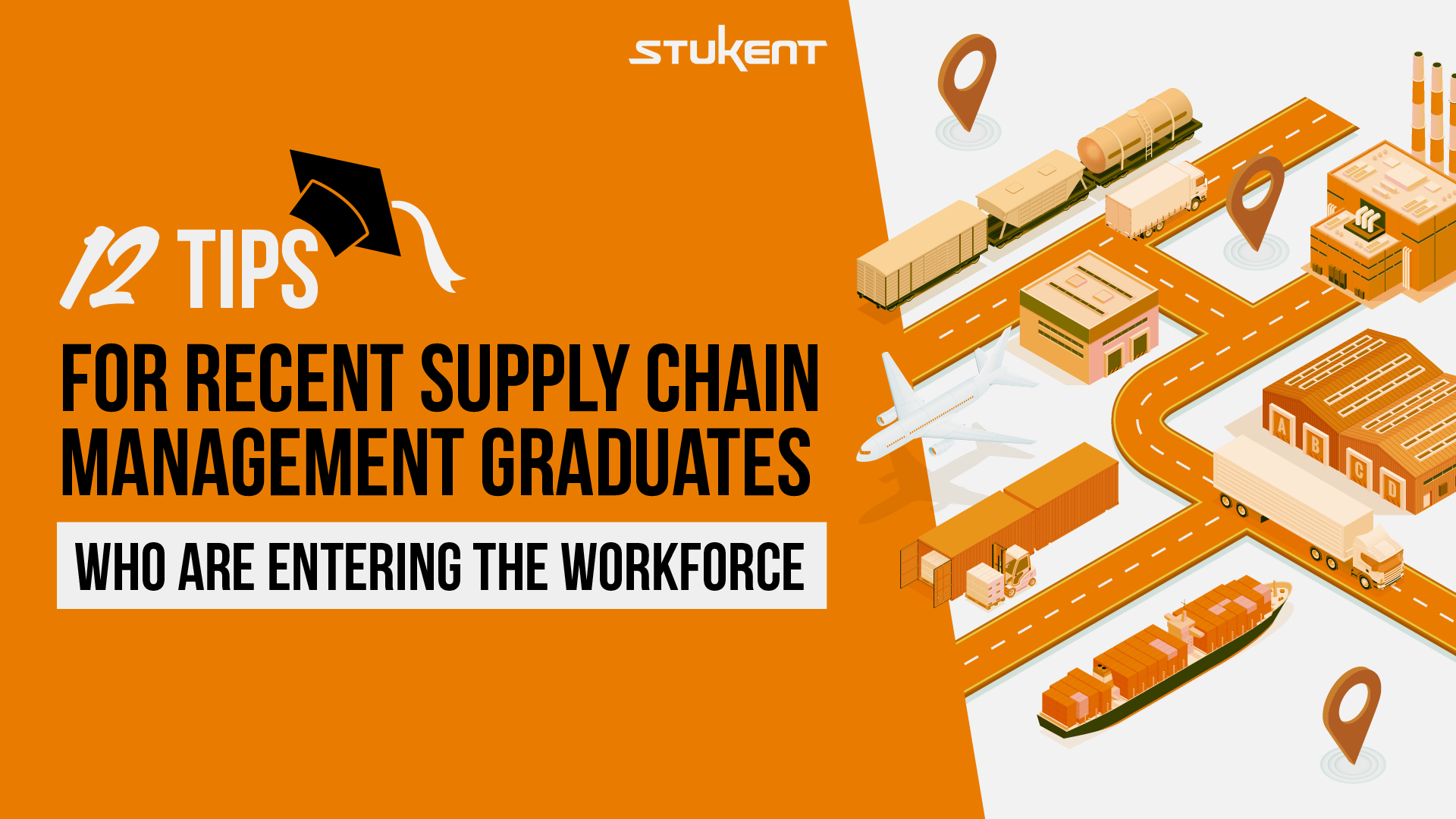Are you ready to take your supply chain career to the next level? If so, you’ll want to read on.
In this article, Stukent explores key tips for recent supply chain management graduates who are entering the workforce. From becoming an extension of your client’s brand to understanding ESG scoring, we provide you with all the tips you need to get started. So what are you waiting for? Start reading!
Here are 12 tips for landing your first job in supply chain management:
- Be an Extension of Your Client’s Brand
- Focus on Developing Your Soft Skills
- Take Advantage of Opportunities
- Focus on Applying for Graduate Roles
- Become More Competitive with a Master’s Degree
- Apply for Internships
- Always Have Foresight for Crises
- Understand Your Company’s Culture
- Don’t Lose Your Composure
- Learn Data Analysis Through Different Tools
- Develop a Strong Network
- Understand ESG Scoring
Be an Extension of Your Client’s Brand
The best piece of advice I can offer to a recent SCM graduate is to be an extension of your brand when you are deciding what is best for the company. As the cofounder of a 3PL company, we work with retailers big and small. We have to ensure that we are a positive and supportive reflection of their brand. To establish a long and trusting relationship, being able to understand and execute their needs is very important.
In my 10 years working in supply chain, I’ve learned that you need to be willing to collaborate and wear different hats, depending on what your client needs.
Courtney Folk, CEO and Founder, Renewal Logistics
Focus on Developing Your Soft Skills
You learned a lot of technical skills in college that will serve you well in the workforce; but to really succeed in your early career, soft skills are very important. Key soft skills include communication, time management, and relationship building.
When developing communication skills, be sure to focus on writing skills as well as speaking, especially if you’ll be working remotely. Time management skills will help you manage your workload and ensure that you stay on track to meet goals and deadlines. Relationship building will help you build connections with your manager and colleagues, as well as clients and customers.
Michael Nemeroff, CEO and Cofounder, Rush Order Tees
Take Advantage of Opportunities
Countless professional opportunities exist in supply chain. The phrase “supply chain manager” actually refers to a wide variety of occupations within an organization. Starting as an expeditor and working one’s way up to a buyer is a common career progression. Operations analyst, loading operator, salesperson, production manager, and logistics specialist are some of the many related occupations.
Earning potential is promising and career opportunities are many. If you have a bachelor’s degree, which is the typical minimum need for entry, and you know that opportunities in this field are expanding, you may feel more optimistic about achieving success in supply chain management.
Kenny Kline, President and Financial Lead, BarBend
Focus on Applying for Graduate Roles
Supply chain management is one of the most challenging industries to get into. Graduates with no experience are often frustrated when applying for junior roles, as these positions require one or two years of experience.
So I always suggest new graduates apply for graduate roles exclusively.
You don’t need experience because these roles are targeted toward anyone fresh out of college.
So, head to graduate-specific websites like Gradcracker.com and apply for jobs. After a dozen or so applications, you’ll receive an offer. Once you have two or three years under your belt, feel free to apply for more senior roles.
Scott Lieberman, Owner, Touchdown Money
Become more Competitive with a Master’s Degree
It is highly recommended for anyone pursuing a career in logistics or supply chain management to have an advanced degree. A degree in supply chain management sets you on a course of familiarizing yourself with the process of getting products from source to consumers and the operations involved. This experience will help you kick-start a supply and chain management career, but the competitive landscape will require you to have more skills to cope and thrive.
Employers tend to favor candidates with higher training in this field due to its competitive nature. A master’s in operations and supply chain management degree elevates your comprehension of a company’s supply chain from a global perspective. It sets you up for a chance to scale heights that set you apart for a prosperous career.
Yongming Song, CEO, Live Poll for Slides
Apply for Internships
Gaining relevant work experience during your academic studies can set you apart from other applicants in today’s increasingly competitive employment market. Since logistics is a growing industry, there are many available paid internships. You never know, towards the conclusion of your internship, you could be offered full-time employment! You should check with the companies and individuals with whom you have established networking connections — something you should be doing from the outset of your professional life.
Kyle Basett, Chief Operating Officer, Altitude Control
Always Have Foresight for Crises
Never underestimate the importance of having the foresight to prepare for times of crisis. Always plan your supply chain around the probability of unfortunate events happening so that you will not be caught off-guard when they do.
Keep in mind that preparedness can make or break supply chain management, especially during a crisis. Thinking ahead will affect not only your organization but all the other people and businesses relying on your supply as well.
Josh Tyler, CEO, Tell Me Best
Understand Your Company’s Culture
One of the first things to understand is the company culture and how that will affect your career in SCM. Within most companies, there is a spectrum between a high-performance culture and a low-performance culture. Companies that are high-performance cultures have higher expectations, but also are more supportive of their employees. Low-performance cultures are the opposite; they have low expectations, but employees are not supported.
It is important to understand which type of culture your company has and to align your expectations accordingly. Don’t expect a company with a low-performance culture to promote you quickly or to provide you with the training and resources you need to grow. Conversely, don’t expect a company with a high-performance culture to promote you quickly or to provide you with the training and resources you need to grow, either. You need to understand your company’s culture before you can understand your role within it.
Luciano Colos, Founder and CEO, PitchGrade
Don’t Lose Your Composure
A profession in supply chain management can be anything but boring. A graduate just coming into the workforce has a ton to discover and learn. There will always be things that don’t go as planned, creating room for uncertainty and disruptions. This would undoubtedly create mental pressure, tension, and adversity. For example, it is possible a plant needs to go offline for an arbitrary inspection, or that crucial cargo from a dealer could be impeded, damaged, or forfeited in the process. Things can go awry at any step. You need to maintain your serenity and stability, which allows you to take immediate action to minimize the impact crises have on your clients and company.
Jason Vishnefske, President, Santa Barbara Chocolate Company
Learn Data Analysis Through Different Tools
You must learn how to do data analysis through different tools, especially big data. In today’s world, every company generates big data which needs special software to be analyzed and utilized for the company’s growth. Having the skill of analyzing such data will add to your profile. Your work will turn out to be a lot easier, and you will make big decisions efficiently and effectively with the results. Being in the field of supply chain management, you will handle important tasks which will need good analytical skills to support your decision-making.
Roger Deutsch, CEO, Alcat-Europe
Develop a Strong Network
One of the most important things you can do for your career is to develop a strong network of contacts. These contacts can be invaluable when it comes to finding jobs, networking for business opportunities, and getting advice and feedback.
There are a few ways to go about developing your network. One is to join professional organizations related to your field. This can be a great way to meet other professionals in your industry and learn about new job opportunities.
Another way to develop your network is to attend industry events and conferences. These events are often excellent networking opportunities, as they provide a chance to meet people from all different parts of the supply chain industry.
Martin Seeley, CEO, Mattress Next Day
Understand ESG Scoring
A supply chain is only as strong and efficient as its weakest partner. Your organization’s environmental, social, and governance strategy will have a direct impact on the ESG score of your supply chain alliances. What are your carbon emissions? What is the social impact of your executive-level decisions? We are in a new era of corporate responsibility. Understanding the basics of ESG will make you a valuable asset at any organization you work with.James Scott, Founder, Embassy Row Project
Whether you’re still a student or just starting your first job search after graduation, Stukent is here to help you prepare for the workforce. Or, if you’re an educator, Stukent is here to help you prepare your students for the workforce with two brand new supply chain courseware that give your students hands-on, real-world experiences in your classroom.
To learn more about Stukent’s supply chain products, visit our website.






